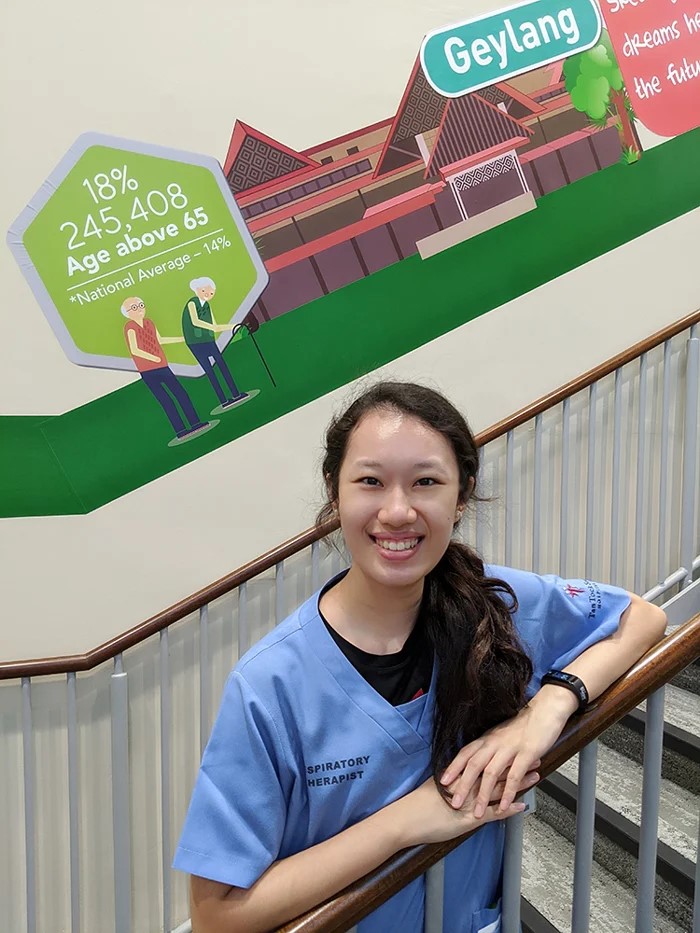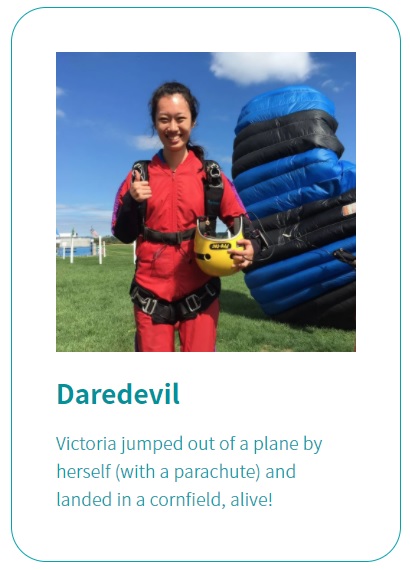Victoria Kwong provides critical care as a Respiratory Therapist at Tan Tock Seng Hospital. She is a Healthcare Merit Scholar, and holds a Bachelor of Science in Health & Rehabilitation Sciences from Ohio State University.
Tough times call for tough measures. The Covid-19 pandemic has propelled Singapore’s healthcare sector into action, and the frontline workers have certainly delivered in spades. For one, the National Healthcare Group (NHG) has been in the thick of the action.
The NHG provides quality healthcare through its network of polyclinics, hospitals, national speciality centres and business divisions. It has more than 18,000 staff, and it aims to provide care that is patient-centric, accessible, seamless, comprehensive, appropriate and cost-effective.
One of NHG’s dedicated staff is Respiratory Therapist Victoria Kwong Jia Ying. The spunky 24-year-old lends her expertise at the Intensive Care Unit (ICU) of Tan Tock Seng Hospital (TTSH), where she facilitates patients to breathe, or breathe better. Lately, the Healthcare Merit Scholarship recipient has also taken up the role of department welfare officer to boost the morale of her colleagues amidst the Covid-19 pandemic.
BrightSparks caught up with Victoria, who talked us through her work at TTSH and her career aspirations.
Healthcare requires a lot of grit and dedication. How did you get interested in your current field?
I have always wanted to work in healthcare as helping others recover is, and always will be, the most fulfilling job in the world. At the same time, I was interested in critical care (ICU, High Dependency) as the patients there require the most help and have a wide variety of presentations that make their care no easy feat. I have always felt that I worked better under stress, and I wanted to challenge myself to provide care to those who desperately need it - hence my choice as a Respiratory Therapist (RT)!
You joined the sector via the Healthcare Merit Scholarship. In your opinion, why should people pursue a scholarship?
In a practical sense, a scholarship helps to cover the cost of tertiary education and provides you with a job in the future. Besides that, scholars are also given many unique opportunities to develop ourselves further, such as learning a new dialect or language via courses tailored for healthcare professionals, honing our leadership skills through planning for events, and improving our clinical skills through local or overseas community service projects.
So, what is it about the Healthcare Merit Scholarship that made you apply and accept the scholarship?
The scholarship officers at the fair in my school encouraged me to go for job shadowing for RT before I made any hasty decisions. Through it, I found out more about the working environment and job scope of a respiratory therapist. I really enjoyed my time there, which led to my application for the scholarship.
 Victoria’s gregarious personality is well-suited to her recent role as department welfare officer.
Victoria’s gregarious personality is well-suited to her recent role as department welfare officer. It says here that you pursued a Bachelor of Science in Health & Rehabilitation Sciences from Ohio State University. What was your biggest takeaway during your university days?
I learnt that communication and time management is key! I had to manage school work, social life and personal life simultaneously. School can get really hectic with clinical placements, attending classes and studying for fortnightly exams all at the same time. Furthermore, studying overseas in the US made me miss a lot of gatherings with my friends in Singapore. Having good communication skills and exploring other means of staying in contact, such as having frequent Skype sessions, were essential in maintaining and forging new friendships.
How did you apply what you have learnt to your current work?
I learnt how to communicate my goals and plans with different healthcare professionals for an effective collaboration that provides the best possible care for my patients. For example, when a patient is unable to have his breathing tube removed due to an accumulation of thick phlegm, I will discuss with the physiotherapist to arrange for chest physiotherapy, while suggesting the doctors prescribe medications to thin out the secretions. Having to deal with many patients each shift, I have also learnt to prioritise the needs of each patient based on their condition and progress, thereby ensuring that everyone is well cared for.
It sounds like what you do is rather critical. Besides, we all need to be able to breathe to stay alive! Tell us more about your role and responsibilities.
In the ICU, I mainly manage patients who require a machine to help them breathe and protect their airways. That includes drawing blood gases to titrate ventilator settings, assisting in bronchoscopy to view the lungs and removing the tube altogether when my patients get better. In this COVID-19 outbreak, we are also helping the healthcare team to flip the patients on their tummy to help them breathe better. During Code Blue, I assist the doctors in airway management, such as putting a breathing tube and ventilating the patient with a bag. In the general wards, I put patients on non-invasive machines that help them breathe better at night.
What is your most significant career achievement to date?
With less than a year’s experience working in TTSH, I have single-handedly managed 17 ventilated patients in the ICU/HD for 12 hours! Recently, I have also taken up a new role as the department welfare officer to boost morale and motivate others through this difficult period of COVID -19. I hope that I will do a good job!
“I have always felt that I worked better under stress, and I wanted to challenge myself to provide care to those who desperately need it - hence my choice as a Respiratory Therapist!”
Victoria Kwong
We’re sure you’ll do great!
There is definitely a kampong spirit in TTSH! Apart from working with nurses and doctors to coordinate the goals for our patients, I also work with physiotherapists to help with secretion clearance and speech therapists to help tracheostomy patients regain their speaking abilities on ventilators. Together, we are able to provide the best possible care for our patients.
What possibilities are there for scholars working at your organisation?
There is a mixture of both clinical work and management roles to develop your capabilities as a healthcare professional further. In my department, respiratory therapists are involved in a wide plethora of specialities and portfolios, such as research, education, welfare, managerial roles, home ventilator management, equipment management and even infection control.
On the same note, what advice would you give to aspiring scholars looking to join the healthcare sector?
The healthcare landscape is ever-evolving, but the goal of bettering patient care has never changed. Keep a curious mind, be open to new developments and indulge in lifelong learning.

This article was first published in BrightSparks Magazine June 2020. Republished with permission from CareerBuilder Singapore.